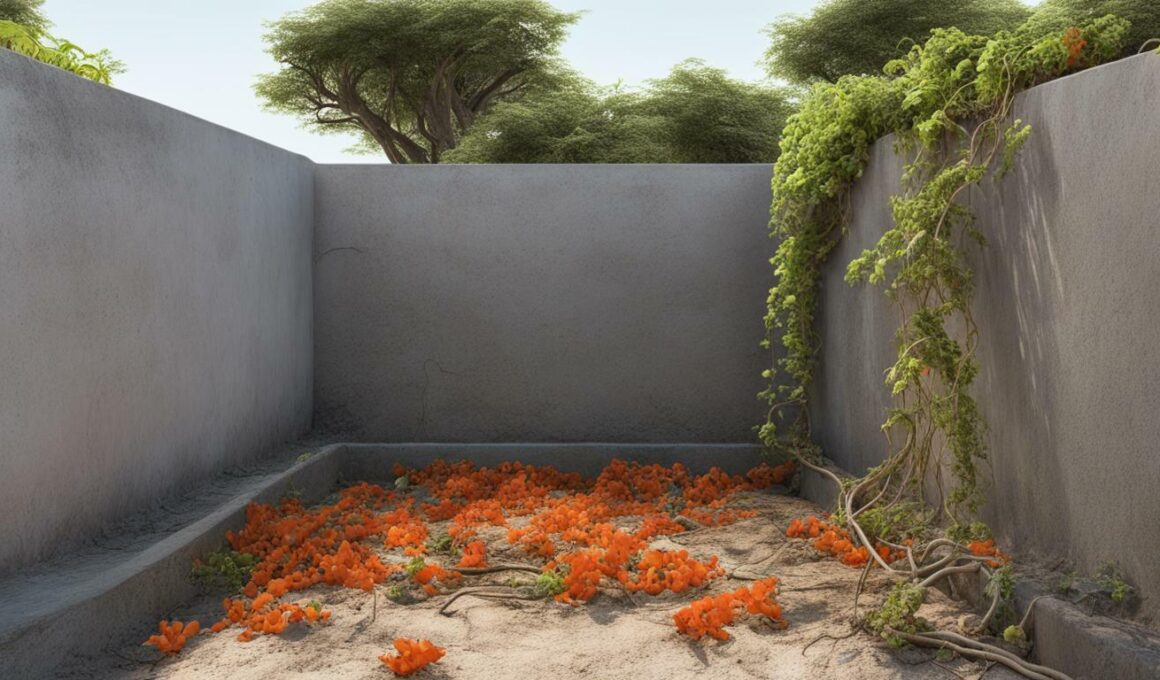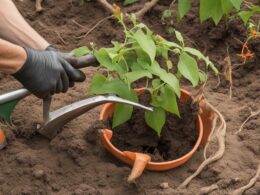If you have a septic system, you may be wondering whether a trumpet vine can penetrate it. The answer is yes, it can. In fact, trumpet vines are among the most aggressive plants when it comes to infiltrating septic systems. Understanding the risks involved is crucial to avoiding costly and inconvenient septic system repair.
In this article, we will explore the potential problems that can arise when plant roots, including trumpet vines, invade septic systems. We will also provide practical tips to help you safeguard your septic system from trumpet vine damage and avoid septic system backup.
Post Summary:- Trumpet vines can infiltrate septic systems and cause damage
- Regular septic system maintenance is essential to prevent root intrusion
Understanding the Risks of Plant Roots in Septic Systems
Plant roots can wreak havoc on your septic system if left unchecked. This includes the trumpet vine, which is known for its aggressive growth and invasive nature. When plant roots invade your septic system, they can cause damage to both the tank and pipes. This may lead to costly repairs and backups.
The best way to prevent plant roots, including trumpet vines, from infiltrating your septic system is through regular maintenance. Schedule annual inspections with a licensed professional to ensure your septic system is in good working condition. During inspections, the technician will check for any signs of plant root intrusion and address issues before they become more severe.
How Plant Roots Damage Septic Systems
| Problem | Symptom |
|---|---|
| Clogs | Drains that are slow to empty or are completely backed up. |
| Broken Pipes | A sudden loss of water pressure or damp, soggy spots in your yard. |
| Leakage | A strong, unpleasant odor around your septic system. |
If plant roots have already infiltrated your septic system, there are a few options to consider in addition to regular maintenance. One option is to install a root barrier, which is a physical barrier made of mesh or cloth that prevents plant roots from reaching the septic system. Another option is to adjust your landscaping to prevent plant roots from growing too close to your septic system. Finally, if you experience any septic system problems due to plant roots, such as backups or leaks, it’s important to address them promptly to avoid further damage.
Don’t let trumpet vines or any other plant roots damage your septic system. By understanding the risks and taking proactive measures, you can keep your septic system in good working condition for years to come.
Can Trumpet Vines Invade Your Septic System?
If you have a trumpet vine growing in your yard, you may be wondering if it can make its way into your septic system. Unfortunately, the answer is yes. Trumpet vines are notorious for their aggressive root systems that can infiltrate underground pipes and cracks in the septic tank.
The main issue with trumpet vines in septic systems is that they can cause clogs and backups, leading to costly repairs and even system failure. Their roots can grow so extensively that they can completely fill up a septic tank, preventing proper drainage. When this happens, sewage can back up into your home or yard, causing a health hazard and unpleasant odors.
It’s important to take preventative measures to avoid trumpet vine infiltration in your septic system. If you have a trumpet vine growing near your septic system, consider removing it or planting it farther away from the tank and drain field. In addition, regular inspections and maintenance can help catch any potential issues before they become major problems.
If you suspect that your septic system has already been infiltrated by trumpet vines or other plant roots, it’s important to contact a professional septic repair company immediately. They can assess the damage and provide the necessary repairs to restore your system’s functionality.
Is Blue Trumpet Vine Safe to Plant Near a Septic System?
Blue trumpet vine and safety facts: When considering whether to plant a blue trumpet vine near a septic system, it’s crucial to be aware of the potential risks involved. The vigorous growth and extensive root system of the vine may infiltrate and damage septic lines, leading to costly repairs. It’s prudent to consult with a professional to ensure the safety of your septic system.
Protecting Your Septic System from Trumpet Vine Damage
If you have a septic system and are concerned about the potential damage that can be caused by trumpet vines, there are several steps you can take to prevent infiltration and ensure the long-term health of your system.
Regular Inspections
One of the most effective ways to prevent trumpet vine intrusion is to have your septic system inspected regularly by a professional. During an inspection, the technician can identify any signs of root intrusion and take steps to address the issue before it leads to more significant damage.
Landscaping Techniques
The way you landscape your property can also play a role in preventing trumpet vine invasion. Be sure to plant trees and shrubs at least 10 feet away from your septic system and avoid planting any deep-rooted vegetation near the tank or drain field.
Root Barriers
A root barrier is a physical barrier installed around your septic system to prevent plant roots from penetrating the tank or pipes. These barriers can be made from a variety of materials, including plastic, fabric, or metal, and can be an effective way to protect your system from trumpet vine infiltration.
Prompt Repairs
If you suspect that your septic system has been damaged by trumpet vines, it is crucial to address the issue promptly. Ignoring the problem can lead to backups, clogs, and costly repairs. Contact a professional septic system repair company as soon as possible to diagnose and repair any damage caused by trumpet vines.
By taking these proactive steps, you can protect your septic system from damage caused by trumpet vines and maintain the long-term health and efficiency of your system.
Conclusion
Now that you know the risks associated with trumpet vines invading your septic system, it’s important to take proactive measures to protect your investment. Remember to regularly inspect your septic system for any signs of root intrusion and promptly address any issues that arise. Proper landscaping techniques and the use of root barriers can also help prevent trumpet vines from causing costly backups and repairs.
Don’t let a seemingly harmless plant like the trumpet vine wreak havoc on your septic system. By staying aware and taking precautions, you can ensure your septic system operates smoothly and efficiently for years to come. If you need professional assistance with your septic system maintenance or repair, be sure to reach out to qualified experts in your area.
Can the Culprit Eating My Trumpet Vine Cause Damage to My Septic System?
If the culprit eating your trumpet vine is causing damage to your septic system, it’s important to find trumpet vine pest solutions. These solutions can help control the pest population and protect your plants and septic system from further harm. Seek professional advice for effective solutions.
FAQ
Q: Will a trumpet vine infiltrate my septic system?
A: While trumpet vines have strong root systems, it is unlikely that they will directly infiltrate your septic system. However, their roots can cause damage to the septic tank and pipes if they grow too close.
Q: What problems can arise if plant roots penetrate my septic system?
A: Plant roots, including those of trumpet vines, can cause clogs and backups in your septic system. This can lead to costly repairs and potential health hazards.
Q: How can I protect my septic system from trumpet vine damage?
A: To protect your septic system, it is essential to engage in regular maintenance practices. This includes regular inspections, proper landscaping techniques, and the use of root barriers.
Q: What should I do if I suspect trumpet vines have infiltrated my septic system?
A: If you suspect trumpet vines or any other plant roots have infiltrated your septic system, it is crucial to seek professional assistance. An experienced septic system technician can assess the situation and provide the necessary repairs or solutions.









